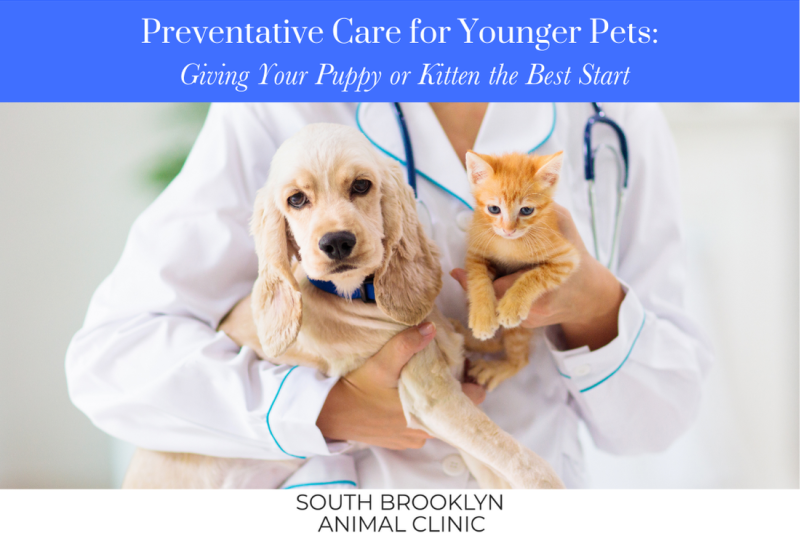Bringing a new puppy or kitten into your home is an exciting and heartwarming experience. Those first cuddles and clumsy moments are unforgettable—but so are the crucial steps needed to ensure a healthy start to their lives. At South Brooklyn Animal Clinic, Dr. Alex Cortes and our team are committed to helping Brooklyn pet parents raise thriving pets through comprehensive preventative care for younger pets.
Let’s dive into why preventative veterinary care is so important, what it includes, and how you can protect your furry friend from common health risks early on.
Why Preventative Care Matters for Puppies and Kittens
Young animals are particularly vulnerable to diseases, parasites, and developmental issues. Just like babies need frequent check-ups and vaccinations, puppies and kittens require regular veterinary visits to monitor their growth and catch any health concerns before they become serious.
Preventative care is more than just vaccines—it’s about setting the foundation for a healthy life, minimizing long-term costs, and maximizing your pet’s quality of life.
What’s Included in Preventative Care for Young Pets?
At South Brooklyn Animal Clinic, our preventative care programs are tailored to each pet’s age, breed, lifestyle, and risk factors. Here’s what you can expect for your puppy or kitten:
1. Comprehensive Wellness Exams
During these visits, Dr. Cortes will perform a full physical examination to check for signs of congenital issues, assess growth, and ensure your pet is developing normally.
2. Vaccination Schedule
Vaccines are essential to protect your young pet from life-threatening illnesses like:
- Parvovirus
- Distemper
- Hepatitis
- Rabies
- Feline leukemia (FeLV)
- Feline distemper (panleukopenia)
We’ll create a custom vaccine schedule to ensure timely protection.
3. Parasite Prevention
Puppies and kittens are highly susceptible to intestinal worms, fleas, ticks, and heartworms. We’ll recommend a safe deworming protocol and monthly flea/tick/heartworm prevention to keep your pet parasite-free.
4. Dental Health Check
Even baby teeth matter! We examine your pet’s mouth for retained baby teeth or bite issues, and educate you on home dental care routines to prevent future problems.
5. Spaying/Neutering Guidance
We’ll advise on the optimal timing for spaying or neutering, which can prevent certain diseases, eliminate unwanted litters, and reduce behavioral issues.
6. Nutritional Counseling
Proper nutrition is vital during the growth stage. We help you choose the right food, understand portion sizes, and adjust feeding as your pet develops.
7. Microchipping and Identification
If your curious kitten or adventurous puppy ever gets lost, a microchip provides permanent identification and increases the chances of a safe return.
The Long-Term Benefits of Early Preventative Care
By investing in your pet’s health from day one, you’re giving them:
- Stronger immunity
- Faster growth and development
- Reduced risk of chronic illness
- Fewer vet emergencies
- Longer, happier life
Early visits also help your pet become comfortable at the vet, reducing anxiety and making future visits a breeze.
When Should You Schedule Your Pet’s First Visit?
As soon as you bring your new puppy or kitten home—or ideally, within the first 3-7 days—schedule their first check-up. Even if they seem healthy, early screening helps catch underlying concerns you may not notice at home.
Why South Brooklyn Pet Parents Trust Dr. Alex Cortes
Dr. Cortes is a passionate and experienced veterinarian who believes in partnership with pet owners. At South Brooklyn Animal Clinic, we take the time to explain every step of your pet’s care so you feel empowered and informed. Our clinic provides a warm, welcoming environment for both pets and people—right in the heart of South Brooklyn.
Frequently Asked Questions:
Q: How often should my puppy or kitten visit the vet?
A: We recommend check-ups every 3–4 weeks until they’re about 16 weeks old. After that, we move to a yearly wellness schedule.
Q: Are vaccinations really necessary for indoor pets?
A: Yes! Even indoor pets are at risk from airborne viruses, contaminated surfaces, and parasites carried in on shoes or clothing.
Q: Is it safe to spay/neuter a young pet?
A: Yes. Most pets are safely spayed or neutered between 4–6 months of age. We’ll help you determine the best time based on your pet’s health and breed.
Q: What should I bring to the first visit?
A: Bring any previous records (if available), a fresh stool sample for parasite testing, and a list of questions you may have. And don’t forget a treat or toy to make it a positive experience!
Book Your Puppy or Kitten’s First Appointment Today
Your pet’s health journey starts here! Let us partner with you to provide the preventative care your puppy or kitten needs to thrive.
📍 South Brooklyn Animal Clinic
2394 Coney Island Avenue
Brooklyn, NY 11223
📞 (718) 676-2494
🌐 southbrooklynanimalclinic.org
Because healthy pets start with proactive care—and we’re here for every wag and purr along the way.

